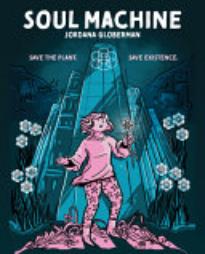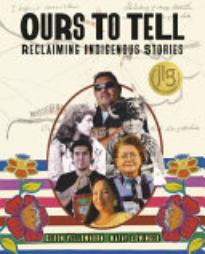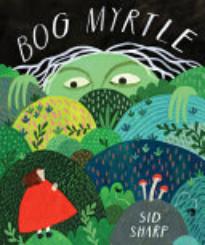Annick
76 Reviews
(2)
YA
This story of fifteen-year-old Chloe, an aspiring soul weaver in a dystopian world run by the megacorporation MCorp, makes for a maximalist graphic novel: dense yet ambiguous, grounded in both fantasy and science, earnest and at times a parody of capitalist society. When the supply of breth (a mysterious plant used by weavers to make souls) grows short, older sister Lacey reluctantly sends the eager and naive Chloe to the big city of M-tropolis to secure more. Guided by her missing father's archives, Chloe is quickly entranced by the futuristic city and two persuasive figures: MCorp's authoritative Maya and rebellious "Nuspiritalist" Persie. Chloe soon discovers that MCorp's nefarious product, Digibreth, is to blame for the decimation of the breth crop. Family secrets, hard truths, and personal sacrifice culminate in the demise of Digibreth, which gives the sisters a renewed sense of commitment to their collective work as soul weavers. Globerman's show-not-tell narrative relies on panel-packed pages, figurative illustrations of metaphysical concepts (such as the interconnectivity of life, or "chain energy"), and shifting monochromatic hues to signify setting and tone. While the mechanics and lore of Chloe's reality remain vague, many dystopian tropes (a fascist police state, over-the-top consumerism, and speculative tech) feel familiar; however, the book's greatest strength lies in Globerman's multifaceted, empathetic characters, with their complex motivations in a complicated world. Discussion questions "with no wrong answers" are appended.
Reviewer: Patrick Gall
| Horn Book Magazine Issue:
September, 2025
(3)
YA
This absorbing and accessible collection highlights Indigenous voices across history and contemporary times. Through profiles of poets, novelists, artists, and historians, the authors present a nuanced narrative of Indigenous resilience and creativity. Stunning photos, archival images, and sidebars enrich the reading experience, while difficult histories are addressed with honesty. Though somewhat loosely structured, the book’s powerful storytelling and diverse perspectives make it a valuable and enlightening read. Back matter includes an afterword, sources, resources, image credits, and an index.
Reviewer: Summer Edward
(2)
1-3
An unconventional graphic novel for the budding young activist with a sense of humor. Sunny Beatrice lives with her selfish, scowling sister, Magnolia. On a well-intentioned errand, Beatrice takes a few treasures from the forest, incurring the wrath of the spiderlike creature Bog Myrtle. With a bit of reasonable conversation, that wrath turns to friendship ("I thought she was going to eat me, but it turns out she's just really into sustainability") and leads to a magic silk sweater for Magnolia...and then to a magic-sweater factory under Magnolia's draconian direction. Beatrice is a heroine to root for, pure of heart in a way that only works in fairy tales, while the deadpan delivery ("Beatrice was very resourceful and good at making crafts, and Magnolia was excellent at telling Beatrice what to do") adds plenty of humor and makes it clear the story shouldn't be taken too seriously. The illustrations in an earth-toned palette, made with "pencil, gouache, watercolor, ink, beet juice, and dirt," are painterly and only sometimes use panels, granting a picture book-like accessibility to this tale of environmental issues, labor rights, terrible sisters, and unexpected friendship.
Reviewer: Shoshana Flax
| Horn Book Magazine Issue:
January, 2025
(2)
K-3
In this heartfelt tale, young Angie becomes a vital bridge between her Cantonese-speaking dad and their new home in Canada. She frequently aids her father in navigating various situations, such as ordering meals and crafting signs for his janitorial job. Soon, Angie identifies a business opportunity--creating English signs for the Chinese-speaking business owners in their neighborhood. Her initial projects include a sandwich board for Ms. Fong's canteen and a stern warning sign for the recalcitrant customers of Ms. Lim's shoe-repair shop. However, a hurdle arises when the laundromat owner, Mr. Chu, voices dissatisfaction with Angie's work. This hiccup morphs into a golden moment, as her father speaks with Mr. Chu in his language (Hakka), unveiling linguistic knowledge that surprises Angie and strengthens their bond. This narrative gracefully illustrates the ties that bind a community and positions language as a potent tool that can both separate and unify people, transforming potential misunderstandings into opportunities for growth, collaboration, and even humor. The story is brought to life with cartoon-style art and bilingual dialogues, represented through simplified Chinese characters and italicized English, offering readers a rich, multicultural experience. This tale presents a hopeful perspective on immigrant life, vividly portraying resilience, a spirit of community, and the enduring bond of family, making it a poignant and uplifting read. An author's note explains the story's linguistic context, highlighting the presence of different Chinese languages with some linguistic similarities.
Reviewer: Weileen Wang
| Horn Book Magazine Issue:
November, 2023
(2)
YA
Immediately following WWII, sixteen-year-old German girl Katja and her sister Hilde become refugees and orphans after a Soviet soldier shoots their mother, blaming her for something Katja said. Katja and Hilde find a place to stay with a farming family, telling the family that the girls' mother is alive and will come to collect them soon. As Katja contends with, and attempts to process, more violence from the Soviet army (including the rape of a secondary character), perpetrated in the name of vengeance, she is dismayed to learn about the extent of the atrocities committed by her own country during the war. For example, she (perhaps willfully, as Hilde suggests) hadn't fully grasped the danger from the Nazis in sneaking to her beloved lessons at her Jewish music teacher's home. Barker sheds light on a rarely portrayed aspect of WWII's aftermath (see also Maria Kiely's Which Way Is Home?, reviewed on page 140). Her expressive writing helps bring readers into Katja's head ("My arms shook. I held them as high as I could, as if higher meant Yes, I surrender even more"), though Katja's naiveté and continued impulsivity, including vandalizing a Soviet officer's car, might have been more believable and sympathetic in a younger character. An author's note discusses the time period and Barker's reasons for writing about it: "to ask tough questions and face unsettling truths."
Reviewer: Shoshana Flax
| Horn Book Magazine Issue:
July, 2020
(2)
K-3
Illustrated by
Maya McKibbin.
Swift Fox's dad is coming to visit. Unlike their usual visits, today Dad will be driving her to meet her family on the reserve: "Today you're going to learn how to be Mi'kmaq." The girl is apprehensive ("What's Mi'kmaq?") and her father's response doesn't help: "It's how you walk, talk, and think." When she gets to her family's home, she is greeted by aunts, uncles, and cousins. The earth-toned, digital-looking illustrations depict a family of varying skin tones, hair colors, and textures; Swift Fox can easily see the resemblance among them and to herself. However, her uncertainty about the unfamiliar smudging ceremony leads her to run from the house. Eventually the smell of her dad's fry bread--something warm and familiar--brings her back. Readers can relate to the fear of meeting new people and learning new traditions; throughout the illustrations there are butterflies, a reminder of how the character's "belly fills with" them. The story authentically depicts how a child might feel being introduced to a culture that they haven't had the opportunity to participate in regularly. In the author's note, we learn that Thomas grew up "off-reserve," and that, like Swift Fox's father, her dad did his best to teach her what it means to be Mi'kmaq.
Reviewer: Nicholl Denice Montgomery
| Horn Book Magazine Issue:
November, 2020
(2)
4-6
All the women in sixth-grader Shelly's Ililiw/Cree family have the ability to communicate with the dead. Grandma helps the dead move on, and Shelly loves being her apprentice. Then an unthinkable tragedy occurs. Grief-stricken, Shelly snares ghost after ghost and smuggles them home. But none of them is the one she longs to find, and by "collecting" them, she is upsetting the natural order. Alongside grief and the afterlife, Mills explores themes of identity, belonging, and the challenges of being bicultural in this poignant novel.
Reviewer: Katie Bircher
| Horn Book Magazine Issue:
November, 2019
(2)
4-6
Translated by Brigitte Waisberg.
Illustrated by
Maurizio A. C. Quarello.
In 1892 Prague, an inquisitive boy, curious about a Golem story, visits the "forbidden attic" of the Old New Synagogue. The (lengthy) narrative flashes back to 1580, during the Inquisition era, where Rabbi Loew, the Maharal of Prague, creates a Golem to protect his people. Cohen-Janca's text incorporates Jewish folklore and mysticism within an Old World milieu. Quarello's illustrations of the medieval setting are hauntingly beautiful.
Reviewer: Elissa Gershowitz
| Horn Book Magazine Issue:
July, 2017
(3)
K-3
Illustrated by
Dušan Petričić.
Child violinist Joshua prepares to participate in a music competition. Nervous on the big day, he makes a mistake mid-song but then says something that an adult wouldn't dare: "I'd really like to start over." The (semi-)triumphant story, based on a true event in the life of virtuoso Joshua Bell, comes with a visible musical accompaniment of sorts: notes resemble swirling ribbons of color.
Reviewer: Nell Beram
(3)
K-3
Translated by Shelley Tanaka.
A human child in a family of ravens fails to realize that she doesn't resemble her siblings until some birds point it out. She fleetingly attempts to look the part but ultimately embraces her identity: "'I am Rosie the Raven!' I squawked, nice and loud." This clever adoption and self-acceptance story features sophisticated art, occasionally in frame-like panels.
Reviewer: Nell Beram
(3)
1-3
Translated by Shelley Tanaka.
This profoundly odd and unexpected little story, with its thick-black-lined and angular mixed-media illustrations, centers on a fox driven to a life of crime because of his (literal) appetite for books. Translated from the German, the text includes a surprising level of detail and subtle humor about the fox's visits to a library and bookstore, his prison stay, and his rise to fame.
Reviewer: Miriam Steinberg-Egeth
(3)
K-3
Illustrated by
Ken Daley.
In his Kenyan refugee camp, Joseph lusts after older boy Daau's bicycle, which Joseph helps fix up. After moving to America, Joseph zeroes in on a bicycle outside his building; Joseph's fix-it skills facilitate a friendship and his coveted ride. Farish's child-focused text poignantly highlights the young immigrant's experience in an unfamiliar setting. Daley's bright, chunky paintings capture the story's movement and emotion.
Reviewer: Katrina Hedeen
(4)
K-3
When Nathan calls new girl Lila a crow because of her dark features, she's instantly disliked. Led by a friendly crow to its flock, Lila collects feathers to make a dramatic crow costume for the autumn festival, which earns her sudden acceptance in this somewhat unlikely story of otherness. Lila's inconsistently light skin contradicts the text, but Grimard's emotive illustrations are otherwise striking.
Reviewer: Melinda Greenblatt
(3)
K-3
Illustrated by
Isabelle Malenfant.
In an unspecified city, impoverished siblings Pablo and Sofia are pepenadores (scavengers) who look through garbage to find recyclables and items of value. When Pablo finds a real "treasure," a gold chain, he cleverly hides it from predatory "Filthy-Face." Inherently grim but eye-opening and moving, this story about third-world poverty is complemented by its smudgy, sketchlike drawings, illuminated by a few rays of color.
Reviewer: Melinda Greenblatt
(4)
YA
Sisters Phoenix and Sasha face domestic troubles in this dark drama. First, their father moves out without warning, leaving only cryptic postcards that give clues to his whereabouts. Then teenaged Phoenix's charismatic teacher woos her preoccupied mother; he moves in and begins abusing Phoenix. This slim novel, translated from the French, is light on characterization but heavy on eerily intense mood.
Reviewer: Jessica Tackett MacDonald
(3)
K-3
Illustrated by
Qin Leng.
In this heartwarming story of intergenerational best friends, neighbors Harry (age "four and three-quarters") and Walter (age "ninety-two and a half") enjoy playing together and learning from each other year-round. Harry is lonely after his family moves to a new neighborhood, but an unexpected surprise awaits him. Alongside the concise narration and dialogue, the simple yet detailed illustrations contain soft colors and exuberant movements.
Reviewer: Amy Seto Forrester
(3)
4-6
Translated by Rosie Hedger.
Illustrated by
Hilde Hodnefjeld.
This chronicle of the life and struggles of Joseph Merrick, the Elephant Man, is a humanizing narrative portrait covering his family history, societal exploitation, love for poetry, and search for understanding. Illustrations--a quirky assemblage of historical photographs and scratchy, dim-hued drawings--create a gritty, vintage vibe befitting Di Fiore's historical tale of discrimination and inner beauty.
Reviewer: Andrea Curtis
(4)
YA
Lowinger relates the true story of how Ella Sheppard and the Jubilee Singers used African American spiritual music to save Fisk University. The narrative jumps between slave history; vignettes from Ella's life; and biographical information about Ella and the choir, whose individual personalities aren't very well fleshed out. Photos, illustrations, song lyrics, and maps are included. Reading list, timeline. Ind.
Reviewer: Amy Seto Forrester
(3)
YA
With Laura Scandiffio. Foreword by His Holiness the Dalai Lama. Gray documents a harrowing journey across the Himalayas for two brothers, Pasang (eighteen) and Tenzin (ten). They escaped oppressive Chinese Communist authorities in their small Tibetan village and reached asylum in Dharamsala, India, home of the Tibetan government-in-exile. The riveting account includes some maps and an insert of black-and-white photos. Timeline. Glos.
Reviewer: Melinda Greenblatt
(4)
YA
Adapted from spoken-word poet Koyczan's performance and animated video about bullying and empowerment, the message sometimes gets lost in the illustrations (by thirty different artists), with phrasing and stanzas broken across pages in a way that makes them difficult to scan and less effective than the original performance. Still, this is a powerful poem on an important topic. Resources appended.
Reviewer: David Elzey
76 reviews
We are currently offering this content for free. Sign up now to activate your personal profile, where you can save articles for future viewing.























